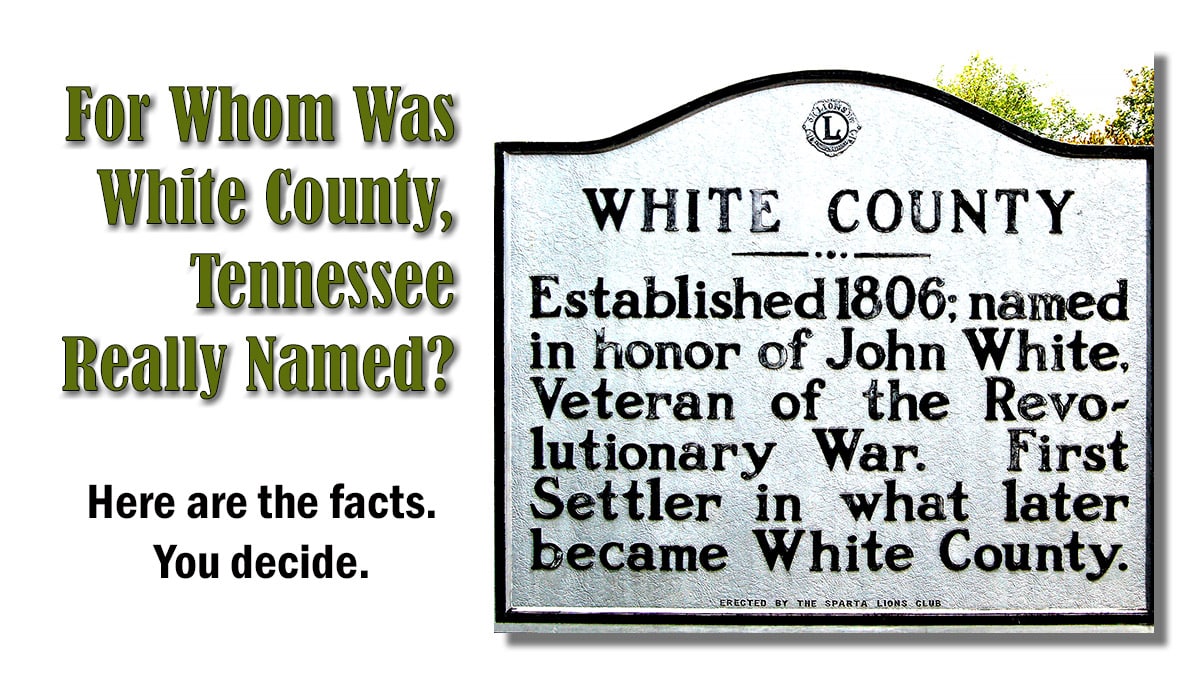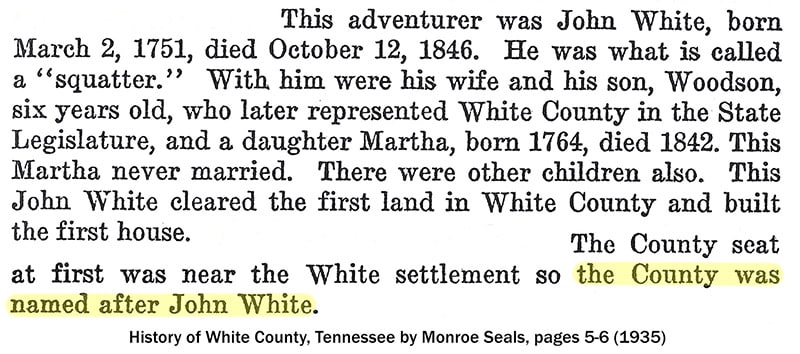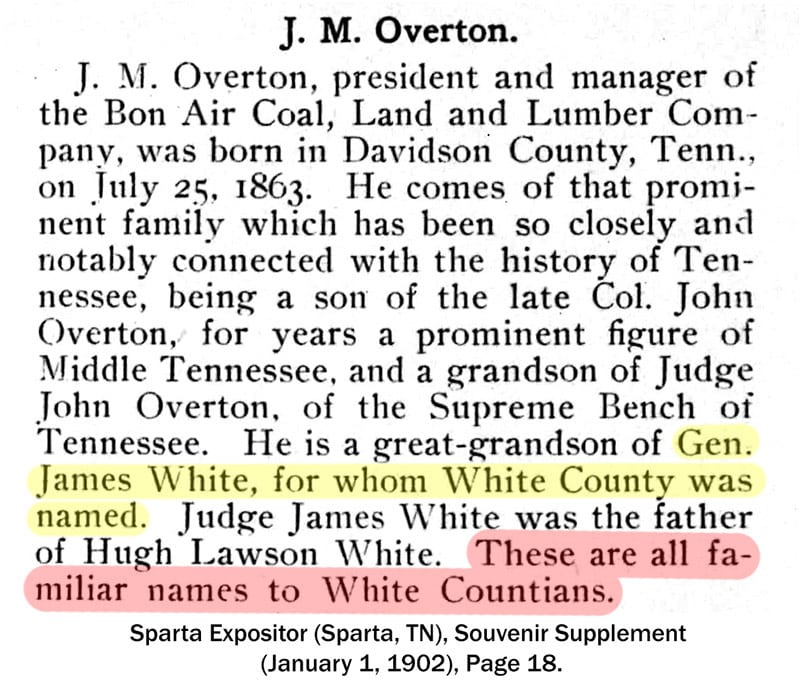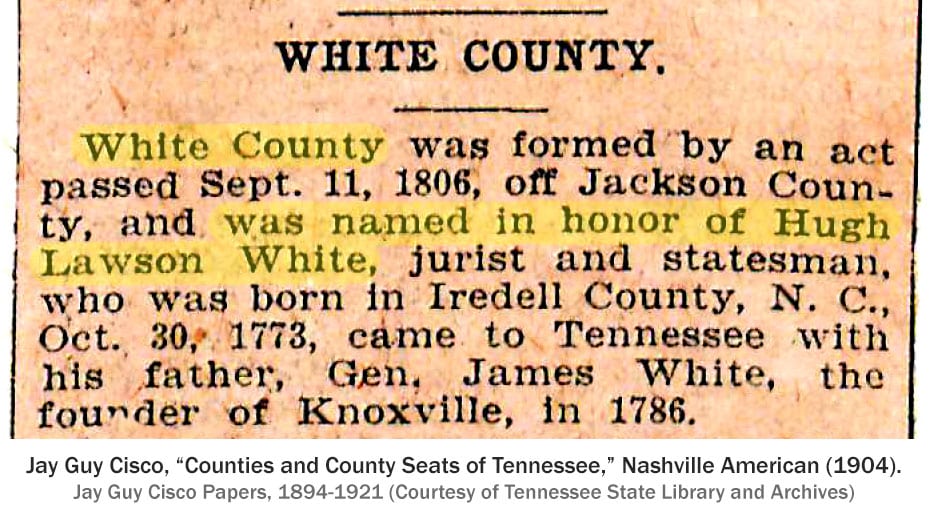Is the Information on this Historical Marker correct?

Was John White the First Settler of White County, TN?
And Was White County, TN Named to Honor Him?
The most common tradition is that the county was named for John White, a Revolutionary War veteran from Virginia and an early settler in White County. Monroe Seals, author of History of White County, stated (without indicating a source) that John White “was the first settler of White County and that the County was named for him.”[i] Seals asserted that John White was living in the White County area as early as 1789, which would have been prior to the 1791 Holston Treaty and 14 years before the October 1805 Tellico Treaty that opened White County to white settlements.
[i] Seals, 84.

As far as I know, there has never been any documentation to prove that John White was in pre-White County that early or that the county was named for him. In fact, there is evidence to the contrary. On July 26, 1804 his daughter, Elisabeth White, married John Scoggins in Washington County, Virginia.[i] And there are tax records that show he and his family were in Washington County, Virginia as late as October 1805.[ii]
[i] Marty Hiatt and Craig Roberts Scott, Washington County, Virginia Marriages – Minister Returns, 1776-1855. (Athens, GA: Iberian Publishing Company, 1994), 178, 406.
[ii] Thomas Jack Hockett, Washington County, Virginia Personal Property Tax Lists, Volume 3 (1800-1807, 1809-1810), (Athens, GA: Iberian Publishing Company, 2005), 155.
According to a previous White County historian, Charles Leonard, John White first settled in the northern portion of White County. Then on June 1, 1808 he purchased 592 acres in the lower end of Hickory Valley, only a mile or so north of the Caney Fork River from the Daniel Haston family. It was on his Hickory Valley land that he built a house which is supposedly the “the oldest house in White County.”[i] In 1995 the building was moved to the White County fairgrounds, north of Sparta, and is still standing.
[i] J. Sharon Johnson Doliante, White County Tennessee Oldest Marriage Book, 1809-1859. (Printed by author, 1977), v.
Some of my family members who grew up very close to John White’s homeplace have said there were portholes in the original log structure of John White’s house. If that is true, the house was definitely built very early, even before Indian threats ceased in that area. According to a long standing popular story in White County, while John White was clearing ground for his first crop, two hostile Indians captured his 17-year-old daughter or tried to do so. Thus, if that is true, his fears of Indian threats were well-founded.
Although John White did serve his country as a fifer in the Revolution, his service record apparently was not extraordinary and he does not appear prominently in the early records of the county’s government. The first record of his presence in White County is a signature on the July 22, 1806 petition to create the county, the same petition signed by Daniel and Joseph Haston.
In 1965, one descendant-researcher of John White wrote:
This John White is not known to have been in the area which became White County, much before the date he purchased his land there, on June 1 1808. White County was formed in 1806, and John White did not sell his land in Washington County, Virginia until late in 1805. He was neither a wealthy nor a famous man. He had been a Revolutionary soldier, but merely a private. The only possible reason we can think of, and it’s hardly plausible, might be that John White helped to survey the area* which was to be formed into the new county, and by some twist of fate, someone named it for him; but frankly, we doubt any connection.[i]
*In 1976 (eleven years after making the above statement), based solely on the fact that survey instruments were mentioned in John White’s estate settlement, the author of the above statement hedged her previous assertion. She wrote, “We are now inclined to give some credence to the possibility that the county may indeed have been named for John White, Sr.”[ii]
[i] J. Sharon Johnson Doliante, Genealogical Serendipity, Volume I. (Alexandria, VA: published by author, 1965), 278.
[ii] J. Sharon Johnson Doliante, White County, Tennessee Oldest Marriage Book (1809-1859). (Santa Barbara, CA: published by author, 1977), v
There is no evidence that John White surveyed the boundaries of White County. Being a newcomer in 1805 or 1806 to Tennessee, White County in particular, it is unlikely that he would have been chosen to conduct the survey, at least as a lead surveyor.
The earliest (known) account of the history of White County was published in 1886 by the Goodspeed Company, almost 50 years before the 1935 publication of The History of White County by Reverend Monroe Seals and only 80 years after the county was founded. Although it was only a brief overview covering 15 1/2 (small print) pages, the Goodspeed history does provide a wealth of historical data on the origin, description, and early years of the county and appears to be quite accurate. John White is only mentioned once in this 1886 book and that is only in a list of over 100 other names of earlier settlers in the county. The is no special recognition given to him, particularly any mention of White County having been named after him.
As far as we know now, Monroe Seals was the first person to state in print that the county was named for John White. Rev. Seals grew up in the general area where John White and his family lived. Since Seals does not state any documented proof of his assertion, it is very possible that he was simply influenced by family lore that circulated in and around the John White family.
In All Fairness to Rev. Monroe Seals...
PREFACE
I have drawn from all sources, am indebted to hundreds of people, to records and the original section of the Expositor. I aim to give many things not in print. I introduce witnesses who have gone before for sixty years. It has been a difficult task, tradition as such being unreliable, and the written works not much better. I have written under great difficulties.
I have aimed at an unbiased narrative, giving the truth. I likely have made omissions in this work inadvertently, therefore I invite corrections by the public.
-Rev. Monroe Seals
If Not John White, Then Who Was Honored with the White County Name?
General James White?
In 1902, more than three decades before the Monroe Seals History of White County book was published, a special historical edition of the Sparta Expositor asserted that “J.M. Overton, President and manager of Bon Air Coal, Land, and Lumber Company, is great-grandson of General James White, for whom White County was named.”[i] At the time this 1902 article was written, the author stated that “These are all familiar names to White Countians.” In 1806, when White County was founded, the names General/Judge James White (as well as others mentioned in the article) would have been even much more familiar to White Countians. At that time, James White was still very active in East Tennessee. He was the Speaker of the Tennessee Senate, from 1801-1805, finishing his term only about a year before White County was formed and named. During the Creek War, Brigadier General James White led a military offensive in late 1813 against Creek villages in Alabama. He died in 1821.
[i] White County Heritage Book Committee, 1.

General White was certainly a prominent Tennessee man. He was the founder of White’s Fort and Knoxville, and a key military and civic leader in East Tennessee. Many of the earliest White County settlers would have known him from their sojourns in East Tennessee, including members of Daniel Haston’s family.* He would have been the kind of man for which many other Tennessee counties were named–heroic, famous statewide, and a significant leader in the creation and earliest years of the State. Perhaps J.M. Overton knew something about the naming of White County that time has buried.
*Note: You may recall that this James White was the Justice of the Peace to whom Nathaniel Hays went to initiate the “cow tails” case against David Haston. His “White’s Fort” was located across the Holston River from where Daniel’s family lived.


Hugh Lawson White?
Hugh Lawson White, the son of Knoxville’s General James White has occasionally been mentioned as a possible person for whom the White County, TN was named. After filling in several posts particularly in Tennessee’s judiciary and state legislature since 1801, thereunder as a Tennessee Supreme Court justice, Hugh Lawson White was chosen to succeed former presidential candidate Andrew Jackson in the United States Senate in 1825. In 1836, HL White was a Whig candidate for the office of United States President.
Note: Hugh Lawson White was the prosecuting attorney in the Knox County, TN “timothy lot” case in which Joseph Haston, Daniel’s son, was the successful defendant.


In a 1904 article, Jay Guy Cisco asserted that White County was named in honor of Hugh Lawson White, jurist and statesman, who was born in Iredell County, North Carolina. Among other professions, Cisco was an editor of the Forked Deer Blade newspaper in Jackson, Tennessee. Coral Williams responded to Cisco’s claim regarding Hugh Lawson White and White County in her “Legends and Stories of White County, Tennessee” master’s thesis: “It is improbable that the county was named for Hugh L. White, for he was at that time an obscure young man.”
Hugh Lawson White certainly distinguished himself as a key figure in the early decades of the state, but in 1806 he was 33 years old and most of his impressive career was still ahead of him.
The 1887 Goodspeed History of White County, Tennessee does not mention the name of the man for whom the county was named.
Former White County historian Charles Leonard wrote an article for a July 25, 1992 supplement to The Expositor newspaper in Sparta—“Who Was the Founder of White County?” This article was republished in the January-March 2005 edition of the White County Genealogical-Historical Society’s PastFinder newsletter. Leonard made a strong evidence-based case for the county being named for General James White.
But, In View of the Evidence, What Do You Think?
Who was, most likely, the man for whom White County, TN was named?
If you appreciated this article, please share it with others who might also enjoy it.


One thought on “After Whom Was White County, TN Really Named?”